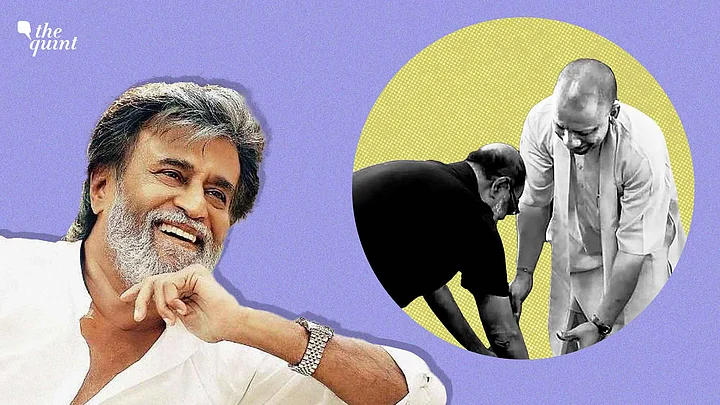Tamil actor and 'Superstar' Rajinikanth recently visited Uttar Pradesh Chief Minister Yogi Adityanath in Lucknow. During the visit, the actor touched the feet of the Chief Minister seeking his blessings. This act by the 'Superstar' has created a furore on social media, with people both questioning and defending why a 72-year-old actor had to fall at the feet of a 51-year-old politician.
The actor himself has claimed that whenever he visits a sanyasi or a yogi, it is his habit to fall at their feet even if they are younger than him. But then, Yogi Adiyanath isn't really a religious mendicant in the true sense.
The politician holds a supremely powerful position in the state of Uttar Pradesh and has been accused of practising hardcore Hindutva politics that has been detrimental to the lives and livelihood of minorities in the state.
That Rajinikanth chooses to look at such a polarising politician as a sage is indeed puzzling.
But then again, Rajinikanth's warming up to the right wing isn't something new.
He has always claimed that his political mentor was Cho Ramaswamy, the popular actor and founder of the right-wing magazine Thuglak. Cho was allegedly considered as the Sangh Parivar's political man in Chennai.
In the past, Rajinikanth has also often met and praised Bharatiya Janata Party (BJP) leaders like LK Advani and Narendra Modi.
Furthermore, when the actor was in the process of considering his entry into electoral politics, he coined his ideology as 'spiritual politics', evoking his own box-office failure Baba (2002).
However, he never took the plunge citing his poor health condition. But in spite of the glaring evidence, it is still not easy to outrightly label Rajinikanth as a right-wing supporter.
Rajini: The Working Class Hero
In cinema, the actor's political posturing has been in complete contradiction to his right-wing hobnobbing in recent decades.
Through the late 70s and 80s, Rajinikanth and Kamal Haasan have represented the conflicting aspirations of the Tamil public.
While Rajinikanth always played the Bahujan working class hero – who was dark-skinned, masculine, and raw – Kamal Hassan often portrayed the sophisticated Brahmin hero from the elite class – who was fair-skinned, well-groomed, spoke English, and even had a touch of femininity at times.
In these films, Rajinikanth often represented the aspiration of the Bahujan class, questioning and fighting against the feudal and capitalistic structures.
On the other hand, Kamal Haasan's characters either represented these very structures or at best, played the role of a rebel from a very privileged family.
It was then no surprise that Haasan films were considered to be made for the (elite) 'classes', while Rajinikanth's made for the (Bahujan) 'masses'.
This distinction between their 'mass' and 'class' roles continued till the early 90s.
But witnessing the huge box-office collection of the 'mass' films of Rajinikanth, Kamal Haasan slightly changed his posturing in the 90s.
With the release of his Thevar Magan (The Thevar's Son) (1992), he captured the imagination of the intermediate dominant castes and was able to reach an entire new market segment.
Seeing its reception, Rajinikanth, too, followed this strategy and made films like Yajamaan (The Feudal Lord) (1993) that appeased the land-owning, dominant intermediate castes.
Since then, Rajinikanth has been performing the balancing act – by alternatively choosing roles that appeal to the working class, like in Uzhaippali (Factory Worker) (1993), or those that appeal to the feudal class like in Arunachalam (1997) or Padaiyappa (1999).
Sometimes, his roles switch between the working class hero and the feudal prince within the same film as well, as seen in Muthu (1995) and Lingaa (2014).
Interestingly, Rajinikanth has hardly played a Brahmin on screen.
Even in a rare film like Veera (1994), he plays the Bahujan who only pretends to be a Brahmin in order to woo a Brahmin love interest. The audience are still aware of the character's Bahujan background. He has also not played any Hindutva-appeasing role.
Even his title role in Sri Raghavendrar (1985), he reflects his own personal beliefs at best and doesn't necessarily play it to the gallery.
Politics in Reel & Real Lives
In recent times, Rajinikanth has played Dalit protagonist roles in the films of Pa Ranjith – Kabali (2016) and Kaala (2018).
Dalit protagonists in such star vehicles have been an entirely new phenomenon. And the superstar's presence in these films has been instrumental in taking the fierce anti-caste politics of the Ambedkarite filmmaker to a wider audience.
As we look through Rajinikanth's filmography, they clearly have spoken the politics of the Bahujan and postured against social structures. But at the same time, his real-life relationship with the right wing has indeed been perplexing.
To add to this confusion, he strongly backed the Dravida Munnetra Kazhagam-Tamil Maanila Congress coalition in the 1996 election and campaigned against the then-incumbent Chief Minister J Jayalalitha – leading to the DMK-TMC alliance's victory.
But 21 years later, he called his 1996 support to the coalition a 'political accident'.
Going by these political flip-flops of Rajinikanth, there can only be two conclusions:
He is either a politically shrewd individual who strategically compartmentalises the politics he espouses for the box-office from what he stands for in real life.
The other possibility is that he might be just a political novice who is easily confused and at variance with his own earlier stances. And probably, we are unnecessarily confusing ourselves by taking his political stances a little too seriously.
Because if we closely look at his multiple attempts at entering electoral politics and then retreating from them, it is very tempting to wonder if he is, in fact, just a political novice.
(Rajesh Rajamani is a writer and a filmmaker from Chennai, who is known for works like 'The Discreet Charm of the Savarnas' and 'Haiku Love'. He tweets at @rajamanirajesh.)
(At The Quint, we question everything. Play an active role in shaping our journalism by becoming a member today.)
